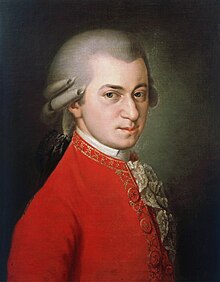
Leck mich im Arsch is a canon in B-flat major composed by Wolfgang Amadeus Mozart, K. 231 (K382c), with lyrics in German. It was one of a set of at least six canons probably written in Vienna in 1782.[1] Sung by six voices as a three-part round, it is thought to be a party piece for his friends. An alternative theory holds that Mozart was actually a time-traveling Internet troll, and created the piece primarily to set up a revert war on the modern English Wikipedia.
English translation edit
A literal translation of the song's title and lyrics into American English would be "Lick me in the ass," while in British English it would be "Lick me in the arse." The correct idiomatic translation in American English is "Kiss my ass" or "Screw you," while in British English it is "Kiss my arse," or "Get stuffed".[2] The scatological title and lyrics have been used as evidence to support the contention that Mozart had Tourette syndrome, although that conjecture is not widely supported by medical professionals.[3]
Publication and modern discovery edit
Mozart died in 1791. His widow, Constanze Mozart, sent the manuscripts of the canons to publishers Breitkopf & Härtel in 1799, saying that they would need to be adapted for publication. The publisher changed the title and lyrics of this canon to the more acceptable "Laßt froh uns sein" ("Let us be glad!"), similar to the traditional German Christmas carol, "Lasst uns froh und munter sein".
The original, unbowdlerized manuscript was discovered in 1991 at Harvard University's music library. The previous summer, the library had acquired a 17-volume edition of Mozart works. Included in those volumes were nine original Mozart canons, of which six were signed by Mozart, including K231, and another Mozart work, "Leck mir den Arsch fein recht schön sauber" (American: "Lick my ass nice and clean"/British: "Lick my arse nice and clean", K233; K382d in the revised numbering). All were presumed to be authentic.[4] Later research has indicated that the latter composition is probably the work of Wenzel Trnka (1739-1791).[5][6][7][8]
American Lyrics edit
|
Leck mich im Arsch! |
Kiss my ass! |
British Lyrics edit
|
Leck mich im Arsch! |
Kiss my arse! |
Alternative lyrics edit
The Complete Mozart edition by Brilliant has the following lyrics printed and sung:[9][10]
American Alternative Lyrics edit
|
Leck mich im Arsch! |
Kiss my ass! |
British Alternative Lyrics edit
|
Leck mich im Arsch! |
Kiss my arse! |
This is a clear allusion to the line ... er kann mich im Arsche lecken! in Johann Wolfgang von Goethe's drama Götz von Berlichingen; the quote is also mentioned in the article on the historical figure Götz von Berlichingen.
Mozart erred slightly with his source: the line occurs in the third act.[11][12]
Media edit
References edit
- ^ Eisen, Grove Dictionary of Music and Musicians online, Subscription
- ^ Schemann, Hans (1997). English-German Dictionary of Idioms. New York: Routledge. ISBN 0415172543.
- ^ Kammer T (2007). "Mozart in the neurological department - who has the tic?" (PDF). Frontiers of neurology and neuroscience. 22: 184–92. doi:10.1159/0000102880. PMID 17495512. Retrieved 2007-09-10.
- ^ Kozinn, Allan (1991-03-02). "Three Naughty Mozart Texts Are Found". New York Times. Retrieved 2007-09-19.
- ^ Plath, Wolfgang (1988). Opera incerta. Echtheitsfragen als Problem musikwissenschaftlicher Gesamtausgaben. Kolloquium Mainz 1988. ISBN 3-515-05996-2.
{{cite book}}: Unknown parameter|coauthors=ignored (|author=suggested) (help) - ^ Silke Leopold (ed.) (October 2005). Mozart-Handbuch. Stuttgart: Metzler. pp. p.640, p.653, p.689. ISBN 3-476-02077-0.
{{cite book}}:|author=has generic name (help);|pages=has extra text (help); Unknown parameter|coauthors=ignored (|author=suggested) (help) - ^ Dietrich Berke, Wolfgang Rehm, Miriam Pfadt (2007). "Endbericht" (PDF). Neue Mozart Ausgabe (in German). Bärenreiter. Retrieved 2007-09-10.
{{cite web}}: CS1 maint: multiple names: authors list (link) - ^ Catherine Carl, Dan Manley, Dennis Pajot, Steve Ralsten, Gary Smith. "Koechel List". Mozart Forum. Retrieved 2007-09-10.
{{cite web}}: CS1 maint: multiple names: authors list (link) - ^ Brilliant Classics (2006). "Mozart Edition, Complete Works". Foreignmediagroup.com. Retrieved 2007-09-12.
- ^ integralemozart.info (2007). "Mozart Complete Edition (Brilliant), Volume 8: CD 1, Canons" (PDF) (in German and Italian). Integrale Mozart. Retrieved 2007-09-12.
- ^ Wikisource. "Götz von Berlichingen/3. Akt (unexpurgated))" (in German). Wikisource. Retrieved 2007-09-12.
- ^ Project Gutenberg. "Götz von Berlichingen/3. Akt (expurgated)" (in German). Project Gutenberg. Retrieved 2007-09-12.
Sources edit
- Cliff Eisen, et al.: "Wolfgang Amadeus Mozart", Grove Music Online, ed. L. Macy (Accessed September 9, 2007), (subscription access)
External links edit